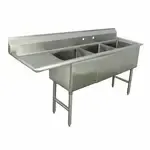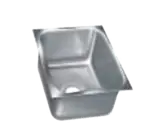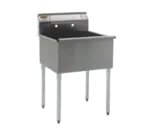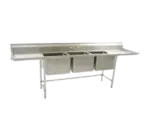
Your Commercial Kitchen: How to Clean Kitchen Sinks?
As a food and beverage professional, you know just how vital a clean commercial kitchen is. That’s why knowing how to clean kitchen sinks is an essential part of any kitchen staff’s training. Sure, while cleaning a kitchen sink doesn’t seem like rocket science, extra precautions need to be taken when you work in an industry that prepares and serves food to the general public.
A dirty kitchen sink can quickly lead to unsanitary conditions that lead to your staff and customers getting sick, something that you, as a business owner, will be held reliable for. So, before diving into how to clean kitchen sinks, you need to be aware of what germs, viruses, and bacteria could be lurking in your kitchen.
Bacteria and Other Germs You Need to Be Concerned About
According to the Centers for Disease Control and Prevention (CDC), each year, nearly 1 in 6 Americans get sick from eating contaminated food. This is thanks to poorly handled food in combination with poor hygiene practices both at home and in commercial kitchen settings.
When most people think of foodborne illnesses, they think of food poisoning. What they don’t understand is that food poisoning isn’t any specific illness. It can actually be a combination of one of the over 250 foodborne diseases that have been identified by researchers. The CDC estimates that nearly 48 million people get sick from a foodborne illness each year, resulting in 128,000 hospitalizations and nearly 3,000 deaths.
While any number of these foodborne diseases can be present in a commercial kitchen, some common germs and bacteria include:
- E. coli
- Toxoplasmosis
- Vibrio bacteria
- Hepatitis A virus
- Listeria
- Parasites and more
Again, this is not an extensive list at all. However, they are more common since they are often found in contamination with food.
Preventing the spread of these germs and bacteria isn’t difficult, especially if you maintain a clean kitchen and ensure your staff is practicing proper restaurant food safety techniques. From washing your fruits and vegetables, to wearing gloves and properly washing your hands before and after touching food and utensils, you can prevent the spread of potentially deadly foodborne illnesses.
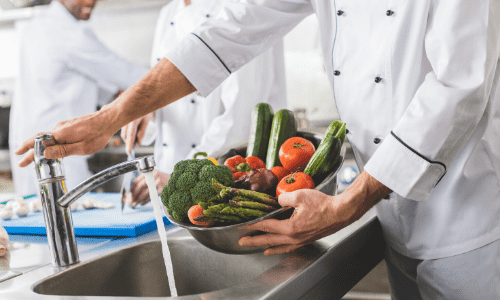
How to Clean Kitchen Sinks Properly
When it comes to answering the popular question, “how to clean kitchen sinks” there is no right or wrong answer. The most significant thing to consider when it comes to your commercial sink is what material it is made out of and what products work best on it.
For most commercial kitchen sinks made out of stainless steel, certain cleaning products will perform better than others, especially when it comes to killing those nasty germs and bacteria.
Believe it or not, you really don’t need expressive “specialty” cleaners to keep your commercial kitchen sink clean. In fact, all you really need is baking soda, vinegar, and a sponge.
The first step is to clean out the sink of any dishes, smallwares, and leftover food debris. Once you’ve done that, sprinkle the sink with baking soda. Baking soda softly cleans your sink without scratching the stainless steel. This is critical because those scratches can become ideal places for germs, bacteria, and viruses to grow and multiply.
Once you’ve finished cleaning the sink with the baking soda, pour a little vinegar into the sink and wipe it down thoroughly. Believe it or not, vinegar is a great natural disinfectant. That’s because it is made of acetic acid, an excellent disinfectant for killing common kitchen germs such as E. coli and even salmonella.
Once you’ve done that, simply rinse your sink out!
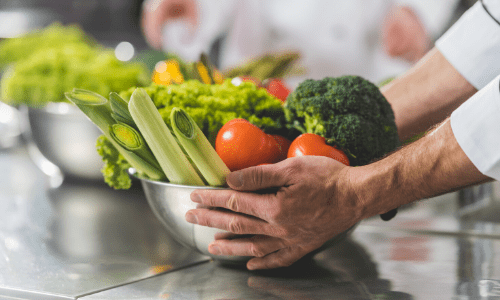
Have a Restaurant Kitchen Cleaning Checklist
Keeping your commercial kitchen clean is an intense process, but it is vital to keeping you, your staff, and your customers healthy. That is why it is crucial that you, as the owner, come up with a restaurant kitchen cleaning checklist.
This checklist must be viewed as a nonnegotiable amongst your staff because it can mean the difference between a thriving restaurant or one that is known for poisoning its customers. Typically, most restaurants have multiple cleaning checklists that are broken up into daily, weekly and longer-term to-do lists.
For example, a typical daily restaurant kitchen cleaning checklist may look something like this:
- Clean out all grease traps
- Wash any and all used equipment
- Run hood filter through the dishwasher
- Chang out all foil linings (grill, flattops, and ranges)
- Clean fryers
- Brush the grill
- Empty sanitizing buckets
- Wash and sanitize all surfaces
- Clean and switch out cutting boards, whip down the prep and line areas
Depending on the nature of your cooking, these may be done at the end of the day or may need to be done throughout the day to keep the cooking line and prep stations properly stocked and running smoothly.
Other tasks that need to be added to a weekly, monthly, and yearly kitchen cleaning checklist may include:
- De-lime sinks and faucets
- Clean the ovens
- Oil all cast iron cookware
- Clean coffee and soda machines
- Clean floor drains by pouring drain cleaners down them
- Wash between the hotline to cut down on grease build-up
- Clean out the freezers
- Calibrate ovens and thermometers
- Wash down all walls and ceilings
- Clean and sanitize your dry storage areas
- Change out any pest traps
- Restock your first aid kits
- Check fire suppression system
- Check your fire extinguishers
- Bring in a professional cleaning team for in-depth cleanings of the equipment
- Clean the piolet lights on any and all gas kitchen equipment
Again, this is only a sample list of items that should be on your short and long-term kitchen cleaning checklists.
CKitchen Has the Right Commercial Kitchen Sink for You
Knowing how to clean kitchen sinks is essential, but so is having the right commercial sink that suits your restaurant’s needs. With 35 years of experience in commercial kitchen and restaurant equipment, we have the expertise to help guide you in finding the right commercial kitchen sink for your needs.
Ready to make a purchase or need some guidance? Then contact us today by either calling us at 1-800-555-0666 or using our live chat option between 9 am and 8 pm EST!

